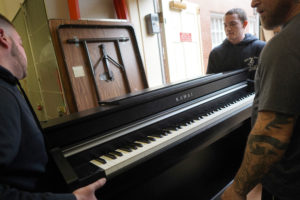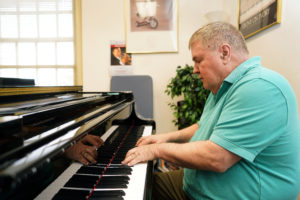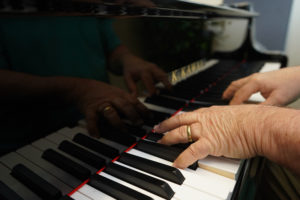From UMW:
Andrew Kraus was in the middle of a performance when he heard it. After playing the first of Brahms’s powerful and dramatic Rhapsodies, Op. 79, he began playing a softer piece. As his hands danced deftly and gracefully across the keys, he heard a distinctive “twang” that rang out through the hushed Dodd Auditorium.

It was a broken string from the middle of the piano, which Department of Music Chair Brooks Kuykendall described as “an exceedingly rare occurrence” – so rare that Kraus, UMW’s principal piano instructor, had never experienced it in his more than 40 years as a concert pianist. But it was a sign that many of the university’s pianos – some of which are over a century old – would soon sound their final notes.
The university received eight new pianos this week through a partnership with Kawai America Corporation. The company delivered the instruments, which are on loan to UMW for a year, to Pollard Hall on Monday. It’s been over a generation since the university last acquired new pianos in 1991.
“Keyboard ability is one of the tools of the trade for a musician … all of our students need to develop a facility at the piano, so quality instruments are essential equipment,” said Kuykendall, who recognized the gravity of the situation when UMW conducted an impartial fleet study by Kawai to assess the state and condition of the existing piano inventory in spring 2018.
The results revealed that 22 of UMW’s 23 pianos had diminished greatly in quality, and the average age of the pianos was 48.3 years. The oldest piano on campus was manufactured in 1901, seven years prior to the university’s founding.

“The heavy use our pianos get is illustrated by the instruments we’re replacing, which have put in 25 years – and in some case, many more – of service to our students,” Kuykendall said. “I’m thrilled that we have this opportunity to provide new pianos for our students to use every day as they create and develop their craft.”
Kawai, whose pianos are found on renowned concert stages worldwide and at prestigious international competitions, delivered eight instruments – two grand pianos, one hybrid grand piano, one digital piano and four upright pianos – to the university at no immediate cost. At the end of the contract year, the loaned instruments will be sold at an on-campus sale and new pianos will replace the old. The contract runs for five years, with a yearly renewal option for the following 10 years.
UMW will have the opportunity to purchase new Kawai pianos, permitted it has the funding. As its Giving Day initiative, the music department had a dollar-to-dollar match of $6,500 and received an additional $4,000 once it reached 25 gifts. With more than $18,000 raised for the #ChangingKeys piano initiative, the department plans to purchase at least one grand piano in this first year, and will likely procure an upright piano as well.
“Having the electronic and hybrid instruments differentiates us in a positive way,” said Kraus, who explained that schools designated as “All Steinway” can only possess acoustic pianos. “There are benefits to UMW students in terms of functionality, such as the ability to record themselves or their accompanists for subsequent use, or to help with composing and arranging.” The new digital and hybrid pianos also have another cost benefit as they will require no tuning and limited maintenance.

UMW students are ecstatic about playing the new Kawai pianos. Kassie Phillips ‘21, a double major in music and history, said the oldest pianos “should be in museums rather than college practice rooms.”
“I had a habit of choosing my practice room based on the specific piece that I wanted to play and which piano would get me the least bad sound for it, so I’m excited to be able to go into any room and find a working piano,” Phillips said.
As for Kraus, he already plans to play Balakirev’s “Islamey” the first time he is seated at a new Kawai piano. It’s a dizzyingly fast work that he describes as “one of the most technically challenging pieces in the piano repertoire. One needs a piano that can respond very quickly to play it.”
And he won’t have to worry about breaking a string this time.
























